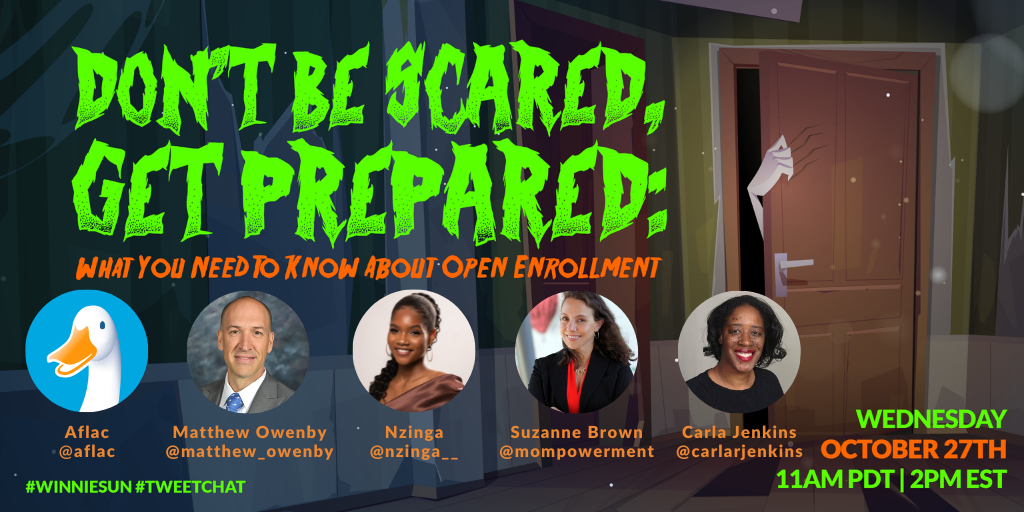Don't Be Scared, Get Prepared!
Did you know that according to the Aflac Workforces Report, 53% of employees find trying to understand what insurance or benefits they need to be somewhat or VERY stressful? Choosing the right health care plan, especially in light of the pandemic, is essential! With the vital open enrollment period opening in early November, employees should know how to approach insurance plans with a calm and collected mind.
Although facing all of the options all at once can be tough, with the right knowledge and preparation, you’ll be able to make the best selections for your future. To help you navigate the open enrollment period, we’ve invited expert panelists Matthew Owenby @matthew_owenby, Nzinga @nzinga__, Suzanne Brown @mompowerment, and Carla Jenkins @carlarjenkins to share their tips on how to prep for success!
Missed the Tweet Chat? Here’s a recap:
Q1. Tell us where you work! Tag your company and tell us what open enrollment is like at your workplace. Why is it such an important time of year for you and your family? #WinnieSun
Suzanne Brown: Open enrollment is important to employees & employers because benefits are given through an employer or through a group. Sign up in the window to get benefits or you might not get them in the US. Medical care, mental health, etc. are expensive out of pocket.
Nzinga: I am an intern for @HomepointLoans in the DEI office within the HR department! Homepoint has great resources regarding open enrollment for all qualifying associates including Q&A sessions. Open enrollment is an important time for me to learn more about what benefits I would like to have and take advantage of when I enter the workforce full-time!
Q2. What lessons have you learned about health insurance coverage? What do you think are the most common errors people make during open enrollment? What do you think the consequences are for those mistakes?
Suzanne Brown: More than anything, shifting things online was supposed to make it easier. It is often harder to understand. The other part of costly mistakes is not anticipating any major changes. For example, if you think you might add to your family next year, consider that when you choose medical benefits. You can change things after the baby arrives, but not before. You need to evaluate how your health insurance is meeting your needs. If it's not, time to look for new options or change things up.
Nzinga: I have learned the importance of understanding exactly what is and isn’t covered by your health insurance. You don't want to end up missing out on opportunities or find yourself unprepared in the case of an emergency.
Lori Anding @southbaysome: You must be your own advocate. Make sure you understand everything.
Q3. How has the pandemic affected the way you view your health insurance options? Have you made changes? How do you think our current environments affect your open enrollment decisions?
Suzanne Brown: The pandemic has compressed timelines for companies to embrace tech, understand that employees want and need a more holistic version of wellness (not only healthcare benefits), and normalized access to mental health experts (especially via telehealth here).
Nzinga: I have learned how incredibly lucky I am. As a college student who is claimed as a dependent, I have the privilege of staying on my parents health insurance for a few more years and haven’t had to worry about making changes to my benefits. I think our current environments have proven how important it is to value full coverage when looking for benefits. It is also important that full coverage is available to everyone at an affordable price.
Matthew Owenby: Interestingly, last year our Aflac WorkForces Report found the pandemic served as a wake-up call for people to spend more time researching their benefits. This year, we saw that put into action. Supplemental benefits, like the plans Aflac offers, helps with expenses health insurance doesn’t cover, like copayments plus everyday expenses such as rent/mortgage or childcare
Q4. How do you tackle things that you’re afraid of or intimidate you? How can employees and consumers prepare for open enrollment? How do you ensure you understand the open enrollment process?
Suzanne Brown: As an employee, prep for open enrollment:
*Ask about differences in current vs previous plans
*Don’t be afraid to ask for help from HR or colleagues
*Ask your manager to facilitate meetings with your team or department and HR, even over Zoom.
Knowledge is power!
As employers, you can improve the open enrollment experience:
*Give the process ample time
*Bump up communication and provide value (don't only communicate)
*Test your system (you don't want a system crash when many employees are signing up)
*Be open to questions
Nzinga: I never allow myself to give up or simply not make an attempt at something. I handle intimidating things by taking them one step at a time. Completing something step by step until I am done. A great way to prepare for open enrollment is to look out for all internal communication from your HR department. Participating in Q&A sessions will ensure you understand the open enrollment process.
Matthew Owenby: Do your homework! Review what you spent last year on benefits. Then, evaluate what was received. Did you have a less expensive plan that required more costs to visit an out-of-network doctor? This will help you determine which policy best suits your needs.
Q5. Making open enrollment selections can be overwhelming. How do you start? How do you anticipate what benefits you will need?What are the top 3 more important things to consider when making your selections? What resources do you turn to for assistance?
Suzanne Brown: Consider what is coming up that can affect your health benefits and budget.
*Do you need to have tests done?
*Are you considering adding to your family?
*Is your spouse leaving his/her job where they had coverage?
*Will your children age out of coverage?
Nzinga: You start by making sure that you keep up with any and all enrollment dates. Pay close attention to your age, gender, lifestyle, and goals. All of these factors can be used to determine which benefits you need.
Matthew Owenby: Read the policy details of your company’s benefits offerings to help select the right options for you or your family. If you still have lingering questions, look to experts, including HR professionals or benefits agents, to help explain options.
Tip 1: Understand that healthcare benefit expenses are part of an overall financial plan and determine how much you can afford each year. As with a 401(k) or IRA, consumers need to review the offered plans to find the best fit for their healthcare budget.
Tip 2: High-deductible health plans have become popular in recent years. However, they may be a burden. Compare plans with a slightly higher monthly premium and a lower deductible to determine which is easier to manage within your budget.
Tip 3: Consider supplemental insurance like hospital or cancer plans to subsidize additional costs in the event of an unexpected accident or illness. Supplemental policies are great because they pay cash to help with expenses health insurance doesn’t cover.
Life stages are a reason to reexamine benefits needs. Whether you are a first-time benefits enrollee, recently married or planning to start a family, these milestones should be a factor when considering which insurance plan will best suit your lifestyle.
Q6. Health is Wealth. Your physical health and your financial health often go hand in hand. Why is choosing the right health care plan important for your financial health? How do you choose the right plan for you, your family, and your budget?
Suzanne Brown: Your financial health is impacted by your wellness and your coverage because medical care is expensive in the US. If you make incorrect assumptions about your health and medical care you might be paying a lot more out of pocket. $$$$$ And also remember that preventive care is usually cheaper than dealing with the impact of an illness. Generally, dealing with challenges early on is better than advanced stage options and care.
Matthew Owenby: Unexpected medical costs weigh heavily on employees who aren’t in a financial position to go beyond their current budget, which can lead to stress. Open enrollment is the prime time to ensure the benefits you select will help protect your finances in the event of an unexpected health issue or accident.Take time and ask questions. Be aware of how benefits help meet the needs of you and your family. Be sure to participate in meetings that discuss and compare the various policy options available and ask questions to clarify any confusion.
Q7. Let’s talk about open enrollment for entrepreneurs! This venture can be scarier on your own! 👻 What do self-employed / small business owners need to know about open enrollment? How do you find the steps to take to make sure you (and / or your team) are covered next year? What options are available to you if you can’t afford it?
Paul Haury @PaulHaury: This has been the hardest thing and scariest for me during the ups and downs during Covid. Insurance is way more expensive for solo entrepreneurs. Look for an industry group that you can join in like a co-op for less expensive insurance.
Nzinga: Both the Affordable Care Act and American Rescue Plan Act have provided affordable inclusive healthcare for entrepreneurs! There are so many opportunities amid the pandemic that self-employed workers should consider!
Matthew Owenby: While the pandemic has impacted many small businesses, finding ways to improve their benefits package can help add value to overall compensation packages to attract and retain talent. Supplemental policies can help create a culture that demonstrates positivity and compassion for your workforce while ensuring the company’s bottom line continues to grow. One way to address these financial burdens is to offer supplemental insurance, which pays policyholders cash, unless otherwise assigned, to help with out-of-pocket costs. These policies can be offered on an employee paid or partially paid basis.
Q8. You’ve made your benefits selections. YAY! What can you do to get the most out of your health insurance? What benefits do you think commonly go unused?
Nzinga: Read! Read! Read! Always read the details of your benefits. There are likely even more perks than you think! I also think PTO is a great benefit that more people should utilize.
Matthew Owenby: As a result of the pandemic, popularity of services like telehealth, employee assistance programs and virtual counseling has rocketed, so be sure to take advantage of these convenient services. Supplemental policies also offer a wellness benefit paying policyholders cash for certain preventative care measures, such as yearly checkups, physicals and medical screenings. My biggest piece of advice to everyone participating today is to understand the details of your selected healthcare policies because having financial support and income protection is key. To learn more about how you can supplement your insurance coverage, visithttp://Aflac.com.
There’s a lot to consider when it comes to open enrollment, but hopefully this week’s Tweet Chat broke it down for you to understand better. So when the time comes, remember these experts’ tips so you can make the most out of your health care plan.
To stay updated for more content like our Twitter Chats, follow @WinnieSun! Have a question for Winnie? Use the #AskWinnie to get your questions answered!


